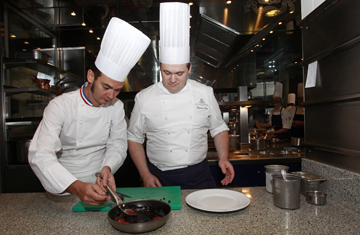
In Paris, Tour d'Argent head chef Laurent Delarbre, left, and head pastry cook Guillaume Caron prepare a honey dessert on Sept. 24, 2010
Enfin! After more than two years of lobbying by President Nicolas Sarkozy and a brigade of French chefs, academics and politicians, French cuisine has finally earned a spot on UNESCO's World Heritage List. The "gastronomic meal of the French" — defined as "a festive meal bringing people together for an occasion to enjoy the art of good eating and drinking" — took its place Tuesday, Nov. 16, alongside other embodiments of "intangible" cultural heritage, including Peking opera and Corsican polyphonic chant, on UNESCO's list celebrating world art forms and traditions.
French ambassador to UNESCO Catherine Colonna declared the recognition a victory for "cultural diversity." But Jean-Robert Pitte, president of the French mission for patrimony and food cultures, which organized the UNESCO bid, hastened to add that "our work has only just begun." France may still have a way to go to ensure the survival of its culinary traditions in the face of globalization and the galloping pace of modern life — especially if it's to prove wrong critics who say the UNESCO listing may have done more harm than good.
First, though, Pitte wants to make clear the motivation behind the French bid. "This is not about trying to conserve the recipe of blanquette de veau or boeuf bourguignon," nor is it "an affirmation of superiority," he says. "Every country in the world has dishes of quality and identity that people gather around and share. But there is a French way to prepare a gastronomic meal, with a succession of dishes and association of food and wines, that is specifically French." Celebrating that timeless choreography of Grand-Mère's Sunday meal, with its rites, menu and arts de la table, didn't seem to be what Sarkozy had in mind, however, when he announced France's UNESCO campaign in 2008, saying, "We have the best gastronomy in the world — at least from our point of view." And to Pitte's frustration, that initial boastful impression has persisted.
The U.K.'s Daily Telegraph joined the most hostile critics on Tuesday when it charged that France's UNESCO bid was symptomatic of a country unable to come to grips with its status as "deposed number one" of the culinary world. "Italian food, with its freshness and simplicity, and more recently Spanish cooking, with its vibrancy and inventiveness, supplanted it in foodie affections," the editorial read. "The artery-clogging richness of the saucing and the prissy presentation went out of vogue ... Yet the grandiose self-importance of French restaurants and the froideur of their staffs survive."
Such reactions don't surprise Luc Dubanchet, founder of France's Omnivore Food Festival, who feels the UNESCO bid has been "counterproductive" for France, reviving old nationalist feuds and reinforcing "our image ... as arrogant and convinced of being key holders of some unique knowledge — which is simply not true." Dubanchet founded the Omnivore festival, which annually hosts equal numbers of French and foreign chefs, precisely to celebrate and encourage a new generation of cooks who are increasingly open to exchanging world culinary traditions and liberated from haute cuisine's old Escoffien dogma. "Cuisine is a common, universal language, and we need to stop with these power struggles," he says.
Pitte doesn't deny that the French have too often been guilty of smugness, boasting about their marvelous cuisine and wines. And consumer polls paint a troubling portrait of the future of French food, revealing a society increasingly struggling to find time to gather the family together for dinner or to make a meal from scratch. "What's threatened is the joy of living we get through what we eat and drink," says Pitte. To reawaken French passion for good eating, he's working with the Ministries of Culture and Agriculture to develop measures to help protect the nation's culinary heritage, including launching a TV channel dedicated to cuisine and culinary culture, introducing new programs in primary schools and opening a major museum center dedicated to the culinary arts of France and the world.
Meanwhile, Catherine Dumas, the French Senator charged with following the UNESCO bid, is convinced the recognition will "help us fight certain European regulations that don't conform with our tradition." After all, this "intangible" gastronomic meal that UNESCO has recognized "is constituted by very tangible things, like wine and agricultural products," she says. And many traditional food producers, like Stephane Blohorn, president of the Androuet cheesemakers, hope the listing will encourage the adoption of new legal protections for their professions. Blohorn fears that the production of artisanal unpasteurized raw-milk cheese will become a thing of the past in the face of pressure from giant industrial groups and an unsympathetic European Commission.
Dumas says lawmakers are finally starting to take gastronomic heritage seriously, pointing to last year's successful bipartisan campaign by French parliamentarians to block the European Commission's plan to allow rosé wine to be produced through simple blending. "For the French, a rosé will never be a blend of red and white wine," she says. "Today, everyone is really up in arms over these issues in France." Indeed, while France's foodie elite continue to disagree on the solutions, they seem to share the belief that the old adage by Jean Anthelme Brillat-Savarin — one of the founding fathers of French gastronomy — carries more meaning than ever: "The destiny of nations depends on how they nourish themselves."
